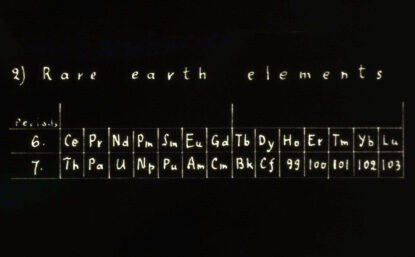Conflicts in Chemistry: The Case of Plastics
Part of the Institute’s Conflicts in Chemistry role-playing simulation game series, The Case of Plastics asks students to consider the positive and negative aspects of plastics through research and debate that explores the science, history, and controversies surrounding this ubiquitous material.
Look around. How many things made of plastic are near you right now? Plastic is everywhere, and we rely on plastics to do everything from preserve our food to replace scarce natural materials. Plastics are cheap, sturdy, and long-lasting. But what makes plastics so useful also makes them contribute to environmental degradation and may pose risks to human health. So how do we balance the valuable role this material plays in our lives and our economy with the challenges it poses to our planet?
During the The Case of Plastics game, you will explore these perspectives and argue a case about the place of plastics in our lives. The game is designed to take one to two weeks of classroom time.
Game Scenario
The Environmental Protection Agency (EPA) is proposing a new regulation to reduce plastic waste in the United States. During the hearing, experts on all sides will argue for their position on plastics and will propose changes to the regulation. After weighing the expert testimony, the EPA regulators will choose the regulation that most effectively reduces plastic waste in a practical, manageable way.
Game Roles
Students take on the role of plastic experts from a variety of backgrounds and perspectives to argue their case before the EPA regulators. There are 33 possible roles, representing EPA officials, health experts and activists, industry experts and lobbyists, inventors and innovators, recycling and sustainability experts, and pollution experts and activists.
How to Play
If you are an expert testifying at the EPA hearing, it is your goal to convince the regulators that the final regulation should reflect your character’s position on plastics. You will be working with a group of like-minded experts—your interest group—to develop the most convincing arguments possible.
First, you must learn as much as you can about your interest group’s positions so you can effectively argue for them. Then you will meet with your group to prepare answers to questions they might ask, arguments for your positions, and counterarguments to the positions the other groups will present. All of these arguments should be based on evidence from your research.
Next, each group will briefly present its position at a hearing and respond to questions from the regulators. Each group will have the chance to respond to each question and to the other groups, so you must be prepared to explain not only your own position but also where you disagree with the positions of other groups. After the hearing, you will develop your position into a more concrete list of recommendations for the final regulation.
In a final debate, you will present and argue for your group’s proposal. At the conclusion of the debate, the regulators will select one group’s proposal to adopt into the official regulation. Each interest group will be ranked based on how well its goals are represented in the final regulation. You will receive points if your regulation is selected and points based on your group’s ranking.
If you are a Regulator, it is your job to decide which group and which regulation is most persuasive. You must research carefully, ask thoughtful questions, and pay close attention throughout the game.
Game Resources

History and Future of Plastics
Learn what plastics are, where they come from, how they affect the environment, and the essential role they play in modern life.

Science of Plastics
Plastics are a group of materials, either synthetic or naturally occurring, that may be shaped when soft and then hardened to retain the given shape.

EPA Regulation
This regulation seeks to create a national program of stewardship to address the growing problem of plastic waste.

Student Journal
This downloadable PDF will help students keep track of their assignments.

Hearing Tracking Sheet
Students can track arguments and prepare responses during each stage of the debate with this downloadable PDF.

Resources & Readings
A comprehensive list of assigned readings, video clip links, and other sources needed for game play.
Featured image: Detail of Household supplies sales display featuring Saran Wrap and Handi-Wrap, 1965. Science History Institute.









